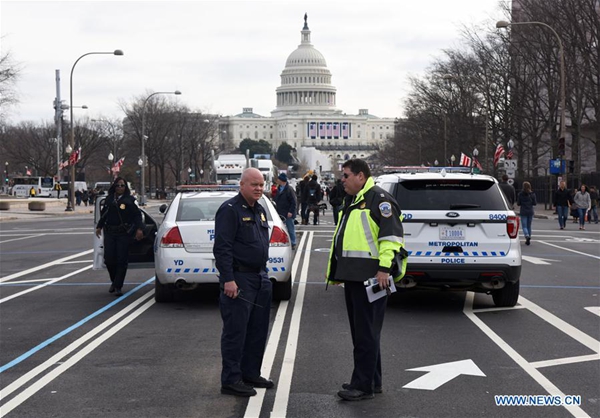President Trump's inauguration: rhetoric becomes reality
- By Tim Collard
 0 Comment(s)
0 Comment(s) Print
Print E-mail China.org.cn, January 20, 2017
E-mail China.org.cn, January 20, 2017
|
|
|
Police officers stand guard near Capitol Hill one day before U.S. presidential inauguration ceremony in Washington D.C., the United States, on Jan. 19, 2017. Some 28,000 in personnel are expected to be deployed here for the U.S. President-elect Donald Trump's inauguration, according to local media's report. (Xinhua/Yin Bogu) |
On Friday Jan. 20 Donald Trump will be inaugurated as the 45th President of the United States of America. This will bring to an end a very strange 72-day period in international relations.
It is well known that American election campaigns often contain some rather extreme and alarming rhetoric, and generally it is understood that this is aimed at a domestic audience and does not necessarily point to what the incoming President will actually do in office. But, once the election is over, the President-elect usually tries to smooth over any damage that may have been done by the campaign rhetoric and emphasizes stability and a degree of continuity.
Trump has not done anything like that. As he sees it, he was elected as the anti-continuity candidate, defeating a former First Lady and Secretary of State. One of his first promises made after winning the election, stated in such uncompromising terms that one can hardly envisage him going back on it, was to abandon the Trans-Pacific Partnership (TPP), one of the central planks of the Obama Administration's trade policy.
It is in this context that we should view one of the most disturbing actions of this period (from China's point of view): the telephone call Trump made to Tsai Ing-wen of Taiwan. It was not only the breaking of a decades-long taboo on direct contact between top Western leaders and the Taiwanese authorities that disturbed the Chinese government; it was the suggestion that this gesture might presage a complete turnaround in U.S.-China policy and a fatal undermining of the "one-China policy."
I doubt very much whether Trump's phone call represents a serious wish to snub China. When he spoke to Tsai, he was formally a private citizen with no government position. Thus he will have thought - and China's moderate but firm response would seem to confirm this - that it would be an interesting experiment during the pre-inauguration period. After Friday, he will not try any such dangerous stunts. I think we will see a much more careful and sober Donald Trump, one who will wish to see the relationship between the world's two greatest economic powers on an even keel.
Over the long term, however, China will have a lot to think about concerning one of the more consistent of Trump's foreign policy declarations: his clear indication that he seeks rapprochement with Russia. There is of course no reason why improved U.S.-Russia relations need to interfere with the good working partnership that China has built with Russia in recent years; but maintaining the Beijing-Moscow axis will not be quite so straightforward once the two countries are no longer so frequently driven into a common cause by criticism of America.
The same goes for other countries that have drawn closer to China and Russia as a result of American pressure and criticism on issues such as "human rights." Last year there was a major row between President Obama and the newly-elected President of the Philippines Rodrigo Duterte. After Obama criticized Duterte's radical anti-drug policy, the latter announced a turnaround in Philippine foreign policy and a reorientation towards China and Russia. It could be that the new approach promised by Trump, with less inclination to interfere with domestic policies, will win friends - or at least reinforce existing alliances - in the East Asian region.
And this will be the real issue for China during the Trump presidency - the future of alliance systems in the Pacific. Trump has said some not entirely friendly things about America's allies in Northeast Asia, notably Japan and the Republic of Korea; he has made it clear that the U.S. wishes to see greater contributions from allies to their own protection (this applies to Western allies as well). Does this imply that he is really prepared to distance himself from what have always been seen as U.S. commitments in the region? I doubt it, but he has not yet made himself clear.
We will know more from Jan. 20 onwards, if only because after that date what Mr. Trump says on international affairs will carry the official seal of the Presidency and can no longer be disregarded as just throwing ideas around on social media as an experiment. Trump's use of his pre-inauguration period has not been conducive to a feeling of security regarding the world's future. It can only be hoped that the program he sets out in his inauguration speech leaves his administration's intentions a little clearer than hitherto.
Tim Collard is a columnist with China.org.cn. For more information please visit:
http://www.ccgp-fushun.com/opinion/timcollard.htm
Opinion articles reflect the views of their authors, not necessarily those of China.org.cn.






